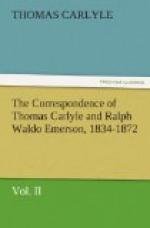Farewell.
R.W. Emerson**
----------- * The late Horace Mann.
** The following passages from Emerson’s Diary relating to Past and Present seem to have been written a few days after the preceding letter:—“How many things this book of Carlyle gives us to think! It is a brave grappling with the problem of the times, no luxurious holding aloof, as is the custom of men of letters, who are usually bachelors and not husbands in the state, but Literature here has thrown off his gown and descended into the open lists. The gods are come among us in the likeness of men. An honest Iliad of English woes. Who is he that can trust himself in the fray? Only such as cannot be familiarized, but nearest seen and touched is not seen and touched, but remains inviolate, inaccessible, because a higher interest, the politics of a higher sphere, bring him here and environ him, as the Ambassador carries his country with him. Love protects him from profanation. What a book this in its relation to English privileged estates! How shall Queen Victoria read this? how the Primate and Bishops of England? how the Lords? how the Colleges? how the rich? and how the poor? Here is a book as full of treason as an egg is full of meat, and every lord and lordship and high form and ceremony of English conservatism tossed like a football into the air, and kept in the air with merciless rebounds and kicks, and yet not a word in the book is punishable by statute. The wit has eluded all official zeal, and yet these dire jokes, these cunning thrusts,—this flaming sword of cherubim waved high in air illuminates the whole horizon and shows to the eyes of the Universe every wound it inflicts. Worst of all for the party attacked, it bereaves them beforehand of all sympathy by anticipating the plea of poetic and humane conservation and impressing the reader with the conviction that Carlyle himself has the truest love for everything old and excellent, and a genuine respect for the basis of truth in those whom he exposes. Gulliver among the Lilliputians...




